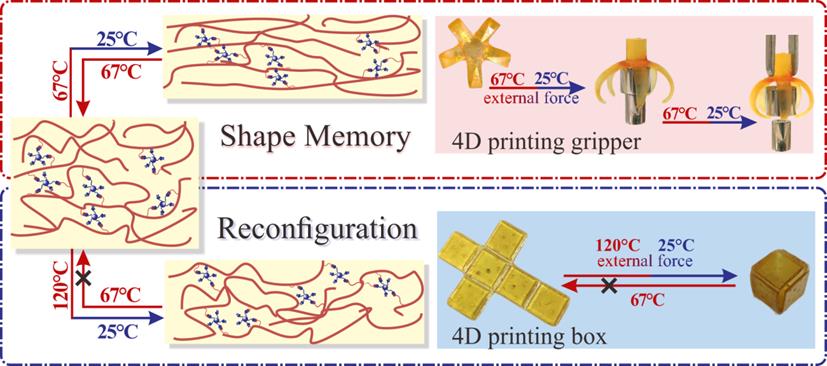Four-dimensional(4D) printing is a novel technology developed by combining 3D printing technology with smart materials. Structures fabricated by smart materials through 3D printing can be transformed by the external stimuli to realize its structural changes over time, thus endowing a forth dimensional, time, for the 3D object. The traditional mode, mechanical transmission and motor drive, will be changed by 4D printing.
4D printing materials can self-assemble in places that are difficult to reach such as underground pipelines, spacecraft and human organs. Application prospects of 4D printing materials include the fields of aerospace, electrical automation, robotics, textile materials, tissue engineering, medical devices, drug delivery carriers and so on.
Recently, in a study published in ACS Appl. Mater. Interfaces, a research team led by Prof. WU Lixin from Fujian Institute of Research on the Structure of Matter (FJIRSM) of Chinese Academy of Sciences (CAS) reported dynamic imine bond-based shape memory polymers with permanent shape reconfigurability for 4D printing.
The researchers synthesized a novel acrylate monomer with aldehyde group (2-(methacryloyloxy)ethyl 4-formylbenzoate, MEFB) and a hyperbranched polysiloxane crosslinker (HPASi) to build (meth)acrylate systems (IEMSis) with dynamic imine bonds for 4D printing.
They found that the flexible chain structure of HPASi significantly enhances the toughness of IEMSis, which are 33-97-fold higher than that of the one without HPASi (IEM). The addition of HPASi also endows IEMSis good shape memory properties, and the shape fixity ratio and shape recovery ratio of them are 97.5-97.6 % and 91.4-93.7 %, respectively.
At the same time, IEMSis can undergo stress relaxation process by dynamic exchanges of imine bonds under relatively mild conditions, thus to acquire an ability of permanent shape reconfiguration. The reconfigurability shown by IEMSi3 will expand the scope of application fields of 4D printing materials.
This study opens a new way to design new 4D printing materials, and their permanent shape reconfigurability will greatly broaden the applications of 4D printing materials.

Schematic of the 4D printing shape memory polymer with two diametrically opposite behaviors including the change of temporary shape (elasticity) and permanent shape (plasticity) under different temperature (Image by Prof. WU’s group).
Contact:
Prof. WU Lixin
Fujian Institute of Research on the Structure of Matter
Chinese Academy of Sciences
Email: lxwu@fjirsm.ac.cn